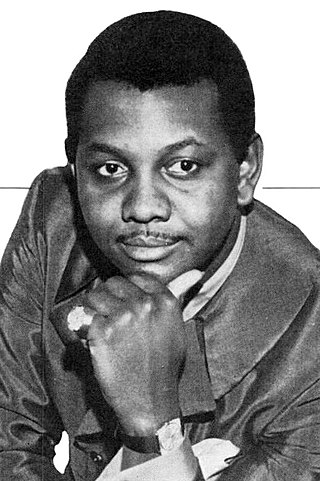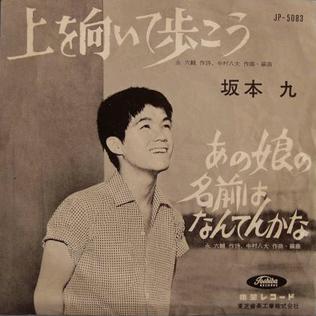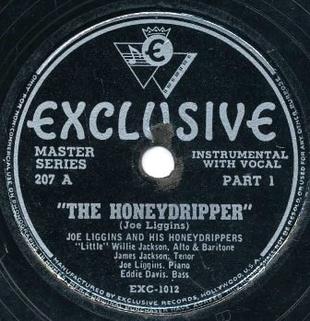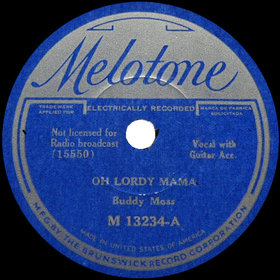Related Research Articles

Charles Hardin Holley, known as Buddy Holly, was an American singer, songwriter, and musician who was a central and pioneering figure of mid-1950s rock and roll. He was born to a musical family in Lubbock, Texas, during the Great Depression, and learned to play guitar and sing alongside his two siblings.

"A Big Hunk o' Love" is a song originally recorded by Elvis Presley and released as a single on June 23, 1959 by RCA Victor, which topped the Billboard Hot 100 for two weeks.

Tyrone Davis, was an American blues and soul singer with a long list of hit records over more than 20 years. Davis had three number 1 hits on the Billboard R&B chart: "Can I Change My Mind" (1968), "Turn Back the Hands of Time" (1970), and "Turning Point" (1975).

"Ue o Muite Arukō", alternatively titled "Sukiyaki", is a song by Japanese crooner Kyu Sakamoto, first released in Japan in 1961. The song topped the charts in a number of countries, including the U.S. Billboard Hot 100 in 1963. The song grew to become one of the world's best-selling singles of all time, selling over 13 million copies worldwide.

Junior Wells was an American singer, harmonica player, and recording artist. He is best known for his signature song "Messin' with the Kid" and his 1965 album Hoodoo Man Blues, described by the critic Bill Dahl as "one of the truly classic blues albums of the 1960s". Wells himself categorized his music as rhythm and blues.

The Clovers are an American rhythm and blues/doo-wop vocal group who became one of the biggest selling acts of the 1950s. They had a top 30 US hit in 1959 with the Leiber and Stoller song "Love Potion No. 9".

Stephanie Dorthea Mills is an American singer and songwriter. She rose to stardom as "Dorothy" in the original seven-time Tony Award winning Broadway run of the musical The Wiz from 1974 to 1979. The song "Home" from the show later became a Number 1 U.S. R&B hit and her signature song.

Alicia Michelle "Miki" Howard is an American R&B singer who had top 10 hit songs in the mid-1980s and early 1990s, including "Baby, Be Mine" (1987), "Come Share My Love" (1986) and "Love Under New Management" (1990). "Ain't Nobody Like You" (1992) and "Ain't Nuthin' in the World" (1989) both peaked at number one on the U.S. Billboard Top R&B Singles chart.
Ella Johnson was an American jazz and rhythm and blues singer.
Arthur Prysock Jr. was an American jazz and R&B singer best known for his live shows and his deep baritone, influenced by Billy Eckstine. According to his obituary in The New York Times, "his heavy, deep voice projected a calm, reassuring virility."
John William Bristol was an American musician, most famous as a songwriter and record producer for the Motown label in the late 1960s and early 1970s. He was a native of Morganton, North Carolina, about which he wrote an eponymous song. His composition "Love Me for a Reason" saw global success when covered by the Osmonds including a number one on the UK charts in 1974. His most famous solo recording was "Hang On in There Baby" recorded in 1974, which reached the top ten in the United States and number 3 in the United Kingdom. Both singles were in the UK top 5 simultaneously.

Marvin Earl Johnson was an American R&B singer, songwriter and pianist. He was influential in the development of the Motown style of music, primarily for the song "Come to Me," which was the first record issued by Tamla Records, the precursor to the famous label.

"Sweet Home Chicago" is a blues standard first recorded by Robert Johnson in 1936. Although he is often credited as the songwriter, several songs have been identified as precedents. The song has become a popular anthem for the city of Chicago despite ambiguity in Johnson's original lyrics. Numerous artists have interpreted the song in a variety of styles.

Woodrow Wilson "Buddy" Johnson was an American jump blues pianist and bandleader active from the 1930s through the 1960s. His songs were often performed by his sister Ella Johnson, most notably "Since I Fell for You", which became a jazz standard.

"The Honeydripper " is an R&B song by Joe Liggins and his Honeydrippers which topped the US Billboard R&B chart for 18 weeks, from September 1945 to January 1946.
"He'll Have to Go" is an American country and pop hit recorded on October 15, 1959, by Jim Reeves. The song, released in the fall of 1959, went on to become a hit in both genres early in 1960.
"A Woman, a Lover, a Friend" is the 1960 follow up single to "Doggin' Around" performed by Jackie Wilson. Just as its predecessor, the single made it to number one on the R&B charts, where it stayed at the top spot for one month. "A Woman, a Lover, a Friend", also charted on the Hot 100 peaking at number fifteen.

"Hey Lawdy Mama" is a Piedmont blues song recorded by Buddy Moss in 1934. The song became popular among jazz musicians with early recordings by Count Basie and Louis Armstrong. In 1943, a version recorded by Andy Kirk and His Twelve Clouds of Joy, with vocals by June Richmond, was a hit, reaching number four on the Billboard R&B chart.

Hold That Plane! is the third studio album by blues guitarist Buddy Guy. It was recorded in November 1969, but not released by Vanguard Records until 1972.
References
- ↑ Whitburn, Joel (2004). Top R&B/Hip-Hop Singles: 1942-2004. Record Research. p. 302.